50mbuffalos.mono.net
- Photos
- Analysis
- Music
- Protests
- Action
-
Blog
- Tzaddikim
- Why humanism
- Beyond protesting
- Hand drilling a regime
- Talking revolution
- Cyrus the Great
- Iran's new era
- Dust storm
- Being Ali Khamenei
- Enter the clerics
- Why so silent?
- Lunatic runs asylum
- Uncentred
- Who to Believe
- Media Superiority
- Journalism from Iran
- Losing the Grip
-
Persian Lion
- Revoking Godwin's Law
- USA out of Iran
- Not Getting It
- Breaking Monopoly
- Geopolitical Crisis
- Lost in Translation
- What next?
- Green Ninjas
- Evin Prison
- Ghoba Mosque
- Radiant face
- Too Civilized
- Swedish riots
- Eerie silence
- Baharestan Sq
- Death of Neda
- News
- Basics
What the Persian Lion Roared
I think only those moved by the events in Iran can really understand the chain reaction set in motion. It is the first major human rights campaign in the new millenium, and the ideals and symbols and methods derived from it may define our cultural struggles for centuries to come.
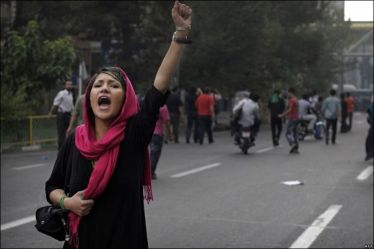
My schooling is one of journalism with an emphasis on International
Politics, and as a person I am a careful idealist with a strong leaning towards realpolitik.
Life has taught me that politics define our lives, acting as a vicar for fate in the life of every individual, and almost everything I see each day affirms that Machiavelli and Hobbes were right more often than not.
So, forgive me if I seem cynical or pessimistic at times.
In politics it is important to stay cool headed, rational, to count cards and play the odds rather than gamble your fortune away, but even in a chess game there should also be room for hope, for passion and for poetry.
Artistic expression is abundant in the current Iranian protest movement; a cornucopia of songs and videos, photo compilations and collages, cartoons, poems, paintings and graphics floods the internet, all somehow signed in green.
This in today, July 1, after I finished a whole bunch of new articles - trying to stay on par with the development. It is from one of those outspoken Persian women on Twitter:
Having witnessed what I have witnessed over the past weeks I have no doubt protests will continue, with or without Western media coverage.
And with prisons filled and overflowing, and torture and execution being no secret to Iranians, it is hard to see what Iran's government has left to throw at the protesters.
Eventually these activists, however fierce the oppression, will have sufficient backup for a general strike undermining the financial platform of the rulers.
Strangely, in this world of big business and political bullying and weapons of mass destruction, the Sea of Green is still the best option - the best hope we have for a solution to the crisis in Iran.
It is also a great hope in the sense that it transcends national interests.
It is hope of a new development, a movement that may inspire the entire Middle East and revitalize the Western commitment to democracy and human rights.
So, there is a lot at stake. No matter how this goes down, it is a global event, something that will have an immediate impact on the world and also affect the future for decades, perhaps centuries to come.
Life has taught me that politics define our lives, acting as a vicar for fate in the life of every individual, and almost everything I see each day affirms that Machiavelli and Hobbes were right more often than not.
So, forgive me if I seem cynical or pessimistic at times.
In politics it is important to stay cool headed, rational, to count cards and play the odds rather than gamble your fortune away, but even in a chess game there should also be room for hope, for passion and for poetry.
Artistic expression is abundant in the current Iranian protest movement; a cornucopia of songs and videos, photo compilations and collages, cartoons, poems, paintings and graphics floods the internet, all somehow signed in green.
This in today, July 1, after I finished a whole bunch of new articles - trying to stay on par with the development. It is from one of those outspoken Persian women on Twitter:
Iran is not falling. Iran is standing up. The enraged Persian Lion is roaring for freedom. Allah-o Akbar!
I believe this is true, in a literal sense, even if phrased in the language of political rhetoric. Having witnessed what I have witnessed over the past weeks I have no doubt protests will continue, with or without Western media coverage.
And with prisons filled and overflowing, and torture and execution being no secret to Iranians, it is hard to see what Iran's government has left to throw at the protesters.
Eventually these activists, however fierce the oppression, will have sufficient backup for a general strike undermining the financial platform of the rulers.
Strangely, in this world of big business and political bullying and weapons of mass destruction, the Sea of Green is still the best option - the best hope we have for a solution to the crisis in Iran.
It is also a great hope in the sense that it transcends national interests.
It is hope of a new development, a movement that may inspire the entire Middle East and revitalize the Western commitment to democracy and human rights.
So, there is a lot at stake. No matter how this goes down, it is a global event, something that will have an immediate impact on the world and also affect the future for decades, perhaps centuries to come.
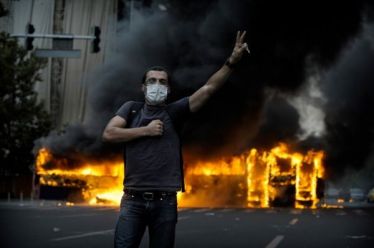
These people will not be stopped
I can't explain my investment in this thing any better. I am an
outsider in this, a non-Iranian, and in no manner religious. I have no
personal reasons to want to make an effort to help change Iran. I have
no partisan affiliation or anything to gain.
Without being able to account for it rationally, I think it is because for the first time since the 2008 US election I see something clearly. Perhaps it is just because I can recognize when someone means business.
I've read a lot of people stating they feel helpless when they watch how things unfold in Iran, but watching the protests never made me felt helpless... so I figure it is time to act. I usually never bother to act, if I do not think there is reasonable chance of success.
Which is my way of saying: This could work out. Over time it could change the nature of politics in the Middle East. Most Iranians believe so, in spite of all evidence, and they are frustrated Westerners don't get it.
It is because Iranians know they are the lion; it is in their soul, their way of existing, ingrained in their nervous system and their culture, somehow more than just metaphor.
Most Westerners do not know this, so they miscalculate. They judge on the surface of things. They do the math and conclude "the resistance is not sufficiently strong", but their calculations leave out the subjective reality, and in politics the subjective reality of the masses always acts like a wild card.
Judging from the outside, merely quantifying things, calculating cause and effect, splitting up demographics and profiling leaders, you do not capture the essence of the soul.
You can only understand it, really, if you have felt - not just seen - these courageous people rallying, marching, raging against the oppression.
I've been watching a lot of footage over the past weeks, scrutinizing imagery, studying facial expressions, clothings, backgrounds, as well as all the mandatory reports - and it all leaves me with an impression of unstoppable force.
Without being able to account for it rationally, I think it is because for the first time since the 2008 US election I see something clearly. Perhaps it is just because I can recognize when someone means business.
I've read a lot of people stating they feel helpless when they watch how things unfold in Iran, but watching the protests never made me felt helpless... so I figure it is time to act. I usually never bother to act, if I do not think there is reasonable chance of success.
Which is my way of saying: This could work out. Over time it could change the nature of politics in the Middle East. Most Iranians believe so, in spite of all evidence, and they are frustrated Westerners don't get it.
It is because Iranians know they are the lion; it is in their soul, their way of existing, ingrained in their nervous system and their culture, somehow more than just metaphor.
Most Westerners do not know this, so they miscalculate. They judge on the surface of things. They do the math and conclude "the resistance is not sufficiently strong", but their calculations leave out the subjective reality, and in politics the subjective reality of the masses always acts like a wild card.
Judging from the outside, merely quantifying things, calculating cause and effect, splitting up demographics and profiling leaders, you do not capture the essence of the soul.
You can only understand it, really, if you have felt - not just seen - these courageous people rallying, marching, raging against the oppression.
I've been watching a lot of footage over the past weeks, scrutinizing imagery, studying facial expressions, clothings, backgrounds, as well as all the mandatory reports - and it all leaves me with an impression of unstoppable force.
A symbol for centuries to come
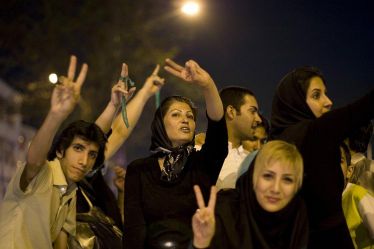
There is no simple rational explanation for a
mass movement like this. Of course there are political, economic and
social factors to take into consideration, but at this point the
movement has become an atavism, a force of nature.
It acts according to its own laws, according to a new universal modus of mankind, one likely to define - it sounds bombastic, pompous - the very future of our species.
If you think about it, the name itself, Sea of Green, contains a profound truth about our existence in the 21st century.
We have become like drops in an ocean, digits in a calculus too vast for comprehension.
In a world with billions screaming for food, for a place to stay and somwhere to belong, and for basic human rights, no individual can secure his own existence on his own.
We are all Iranian in the sense that we have to act together to have any hope of individual fortune or even safety.
The brute force of government repression may seem horrifying, like a display of immense will and power, but the Iranians say: "they are frightened" and "the clerics are divided".
After careful consideration my verdict is that this is more than just propaganda or wishful thinking.
The most important thing I have noticed is: This movement acts as one, in complete unison. The organization, to say the least, is less than impressive.
It is the implicit subordination to the order of things, the dedication of the individual to the group, and the group to the individual, which makes it strikingly effective.
It is the instinctive response to events, the ceaseless and unwavering push for change by millions of individual wills doing the same thing with a minimum of coordination.
Meanwhile the theocracy is splintering, only kept together by fear of their inevitable decline.
You can't fight a body of humans acting as one, responding in perfect unity, without fear or consideration for risk and personal loss.
It is more than "will of man" or "will to power", as Nietzsche defined it, stronger than political scheming; it is will to live, to solve a seemingly unsolvable puzzle, to cut through despair and pave a way to a tolerable future.
You may call it an expression of the most primordial instincts in man, amplified through millions of voices reinforcing each other, urging each other to victory at any cause.
Of course, revolutions pass, and eventually the same societies become stagnant, traditionalist and corrupted, but for as long as the revolution is on, there is a purity to it that defies measurement.
It acts according to its own laws, according to a new universal modus of mankind, one likely to define - it sounds bombastic, pompous - the very future of our species.
If you think about it, the name itself, Sea of Green, contains a profound truth about our existence in the 21st century.
We have become like drops in an ocean, digits in a calculus too vast for comprehension.
In a world with billions screaming for food, for a place to stay and somwhere to belong, and for basic human rights, no individual can secure his own existence on his own.
We are all Iranian in the sense that we have to act together to have any hope of individual fortune or even safety.
The brute force of government repression may seem horrifying, like a display of immense will and power, but the Iranians say: "they are frightened" and "the clerics are divided".
After careful consideration my verdict is that this is more than just propaganda or wishful thinking.
The most important thing I have noticed is: This movement acts as one, in complete unison. The organization, to say the least, is less than impressive.
It is the implicit subordination to the order of things, the dedication of the individual to the group, and the group to the individual, which makes it strikingly effective.
It is the instinctive response to events, the ceaseless and unwavering push for change by millions of individual wills doing the same thing with a minimum of coordination.
Meanwhile the theocracy is splintering, only kept together by fear of their inevitable decline.
You can't fight a body of humans acting as one, responding in perfect unity, without fear or consideration for risk and personal loss.
It is more than "will of man" or "will to power", as Nietzsche defined it, stronger than political scheming; it is will to live, to solve a seemingly unsolvable puzzle, to cut through despair and pave a way to a tolerable future.
You may call it an expression of the most primordial instincts in man, amplified through millions of voices reinforcing each other, urging each other to victory at any cause.
Of course, revolutions pass, and eventually the same societies become stagnant, traditionalist and corrupted, but for as long as the revolution is on, there is a purity to it that defies measurement.
Blood infusion for "tired democracies" in the West
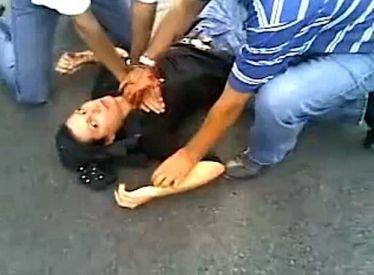
Relating it to the ideals of the French Revolution - freedom, equality
and brotherhood - what characterizes this movement and makes it more
than just an extention of the civil rights movement, is the element of
brotherhood.
It is something we do not have in the West, where we suffer and mourn - more than any other thing - the loneliness that follows excessive individualism.
In Iran it is collectivism working. They may want indivudual freedom, individual rights, but it is the collective force propelling them forward and in an Islamic context you did not see in the Summer of Love.
You may say that black and white marched together in the US civil rights movement, but how deep did the brotherhood go? Overall, the black communities stayed black, and the white communities white - it was an abstract unity.
In USA they did not shout the name of Jesus from rooftops in the night. It was a collective movement, but at a time where collectivism was already lost and the sense of brotherhood nostalgic, resulting in strange hippie colonies.
Today's Iranian protesters may be outgunned, but they are not outnumbered. And in a match of wills, a stand-off like this, the most dedicated wins.
The protesters may look like old people and skinny students confronted with armed cops and Basiji in riot control uniforms, but they have a defined purpose, an unfaltering identity, an unquestioned set of methods, a clear risk assessment.
The others are paid to fight. They have no direction, no way of navigating in the modern world, no other vision but a return to a perfect fundamentalist order that never existed.
I heard or rather, I read, a supporter of Ahmadinejad saying:
As a Westerner I understand this kind of sentiment, the disillusion about Western culture, the view of it as decadent and disruptive of natural bonds, of real affection. I understand, while I do not agree with the severity of the verdict.
Even so, it is unfair to align the Green Revolution with Western - or at least a specificially Western - culture. In many ways "they" - the Iranians - are teaching us a lesson, even if our democracy may seem thoroughly tested and reliable in comparison.
This is at first glance, but when you dig deeper, the West is on the verge of losing any attachment to its fundamental values and any sense of identity - deeply involved as it is in aggressive warfare, neocolonialism and imperialism, kidnapping and torture.
The Iranian election as a Western spectator sport makes sense, because it is an event that revitalizes us - it brings us into contact with what we want to be: Idealists, passionately involved, heroic in conduct and outlook.
It is like a costly infusion of fresh blood for the tired democracies in the West, a revitalization of our commitment to justice, to democracy and human rights, one that even President Obama was not able to produce in the wake of his successful campaign for Hope and Change.
It is something we do not have in the West, where we suffer and mourn - more than any other thing - the loneliness that follows excessive individualism.
In Iran it is collectivism working. They may want indivudual freedom, individual rights, but it is the collective force propelling them forward and in an Islamic context you did not see in the Summer of Love.
You may say that black and white marched together in the US civil rights movement, but how deep did the brotherhood go? Overall, the black communities stayed black, and the white communities white - it was an abstract unity.
In USA they did not shout the name of Jesus from rooftops in the night. It was a collective movement, but at a time where collectivism was already lost and the sense of brotherhood nostalgic, resulting in strange hippie colonies.
Today's Iranian protesters may be outgunned, but they are not outnumbered. And in a match of wills, a stand-off like this, the most dedicated wins.
The protesters may look like old people and skinny students confronted with armed cops and Basiji in riot control uniforms, but they have a defined purpose, an unfaltering identity, an unquestioned set of methods, a clear risk assessment.
The others are paid to fight. They have no direction, no way of navigating in the modern world, no other vision but a return to a perfect fundamentalist order that never existed.
I heard or rather, I read, a supporter of Ahmadinejad saying:
"All the West can offer us is free sex..."
As a Westerner I understand this kind of sentiment, the disillusion about Western culture, the view of it as decadent and disruptive of natural bonds, of real affection. I understand, while I do not agree with the severity of the verdict.
Even so, it is unfair to align the Green Revolution with Western - or at least a specificially Western - culture. In many ways "they" - the Iranians - are teaching us a lesson, even if our democracy may seem thoroughly tested and reliable in comparison.
This is at first glance, but when you dig deeper, the West is on the verge of losing any attachment to its fundamental values and any sense of identity - deeply involved as it is in aggressive warfare, neocolonialism and imperialism, kidnapping and torture.
The Iranian election as a Western spectator sport makes sense, because it is an event that revitalizes us - it brings us into contact with what we want to be: Idealists, passionately involved, heroic in conduct and outlook.
It is like a costly infusion of fresh blood for the tired democracies in the West, a revitalization of our commitment to justice, to democracy and human rights, one that even President Obama was not able to produce in the wake of his successful campaign for Hope and Change.
The brotherhood of man
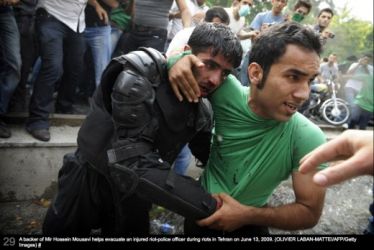
Some
of the most compelling images I have seen are situations, where young
Iranians protesters stop others from attacking police, forming a
barrier of bodies, or where one protester in green helps evacuating a
wounded and obviously shocked policeman.
Even with a view to arrest, torture and death, they defend their enemy, the guy with the gun on the other side.
They have a sense of brotherhood. It's what they add to the equation.
I read somewhere that in the Islamic Revolution they'd ask the soldiers ordered out against them:
This would turn the tide and make the armed forces switch side with the protesters.
July 1, 2009
Even with a view to arrest, torture and death, they defend their enemy, the guy with the gun on the other side.
They have a sense of brotherhood. It's what they add to the equation.
I read somewhere that in the Islamic Revolution they'd ask the soldiers ordered out against them:
"Armed brother, why kill your brother?"
This would turn the tide and make the armed forces switch side with the protesters.
July 1, 2009